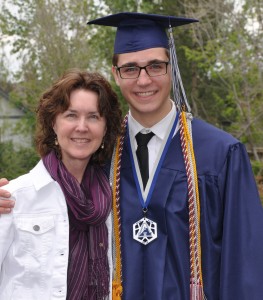Recently, my son, Morgan, and I spoke at a FARE Community Engagement Council event in Denver on “Preparing for and Going to College with Food Allergies.” It was a wonderful event with dozens of attendees – both parents and teens – managing food allergies.
During the presentation, the first thing we discussed was what parents can do to prepare their children in grades K-12 for college. After all, going to college is something that requires planning! And for children with food allergies, more planning is required. Also, more skills are required to be able to safely attend college.

Here was the list we shared that outlines what your child SHOULD be doing, or is able to do, before leaving for college.
- Always carries epinephrine autoinjector – If your 18 year old is heading off to college and Mom or Dad is still reminding them to carry their autoinjector, there’s the potential for a very hazardous situation to occur. Parents aren’t going to be able to ensure that an EpiPen or Auvi-Q is being carried every time a child leaves their dorm room. Carrying epinephrine in a fanny pack or other bag can begin as early as four or five years old so that a child begins to understand that anywhere he/she goes the epi comes too!
- Able to order food at a restaurant – This is a learned skill and one that took our family years to perfect. We had a chef card we created that explained Morgan’s allergies, but we also allowed him to begin to practice ordering his food at about age 10. If he forgot to mention something, we were there to assist. As he moved into high school and attended meals without us, we felt confident he knew how to explain his food allergies and cross contact to the wait staff and/or chef.
- Can effectively read product ingredient labels – For Morgan, he does not eat any food that is labeled “may contain,”so he needs to be especially careful to accurately read every piece of text on a label. Learning how to read can become fun in looking for food allergens listed on a label, and we began that in kindergarten. It’s also important to know when to call the customer service telephone number for a product to determine whether the product is safe or not. Morgan continues to pick up the phone to call a company now that he’s an adult to provide for an extra layer of comfort.
- Can identify an allergic reaction and/or anaphylaxis – This is more difficult if your child hasn’t had anaphylaxis since they were a baby, where they may not remember the symptoms. A discussion with your allergist can assist with your child being able to list symptoms and know when it’s time to administer an autoinjector or an antihistamine.
- Can train friends and others about allergic reactions and epinephrine administration – This is especially important in the college setting, because there is no school nurse who is going to be training friends, Resident Assistants or professors. Practicing at home with expired autoinjectors, injecting them into oranges, helps your child know how to explain administration to friends. The Auvi-Q device was great fun for Morgan’s college friends to learn since it talked them through how to administer!
- Is comfortable making appointments and speaking with a doctor – We had Morgan begin to complete all the pre-appointment paperwork for an allergist’s appointment beginning in late middle school. He needed to know what the names of his medications were and what dose he took. Then we transitioned to him discussing his concerns with the allergist at appointments, with Mom also in the room. Finally, he began to make his own appointments with the allergist and to go by himself. This was necessary before he went to college, because Mom or Dad wouldn’t be able to be with him at every doctor’s appointment.
- Remembers to take medications for pollen allergies and/or asthma – This is a difficult skill, and will probably need plenty of parental supervision. There are also apps, alarms and other technological advances that can help with this. This skill comes in late high school or even later depending upon your child.
- Can advocate with teachers, the Disability Services Office, chefs and employers – A college is going to view your child at 18 years old as an adult, capable of completing their own paperwork. Practicing this skill beforehand is vital for good outcomes in college. Advocating with teachers can begin in elementary school. If Mom/Dad resolve every issue, children don’t learn how to advocate for themselves. Talking through a situation, at home, with your child can help them to gain the courage to handle the situation at school. Of course, there are some situations that still need Mom/Dad to guide, but learning how to speak up early in life helps strengthen the advocacy muscle. Talking with an employer about food allergies is a life skill that your child needs to learn, unless they plan on being independently wealthy!
- Able to shop for groceries and cook for oneself – Learning how to cook is great fun and can be a family activity starting in the toddler years. Label reading at the grocery store can start once your child can read. Both of these skills are so helpful for college students to keep themselves safe and well fed.
I imagine that no child with food allergies is perfect at all of these activities; however, knowing that your child can manage the most important skills will allow you, as the parent, to support your child heading off to college!